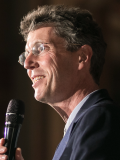The air in Helsinki is clear, cold and fresh. You can almost feel the Arctic winds pushing down, even as the sun shines brilliantly for over twenty hours a day in late May and early June.
An auspicious backdrop for the 2023 World Circular Economy Forum, hosted by Sitra and other partners, and bringing together thousands of professionals on the topic of circularity – and how to achieve this seemingly distant and yet urgent goal in our economies.
There was an audible buzz as I checked into the venue, as large and spacious as the Finnish skies. With a capacity of several thousand, the organizers were ready for a major global gathering of practitioners, policymakers and experts exploring how to move from a linear to a circular economic model.
My role was to speak at one of the plenary sessions, focusing on financing circularity: “Money Talks – what enables a systemic shift for corporates and investors?” My fellow panelists drew from the World Bank, European Investment Bank and IDB Invest, and startups like Circulate Capital.
My task: to summarize their key points into nugget-sized take-home points for policymakers.
As I thought about this, before taking the stage, I was struck by some of the opening remarks made at the forum, particularly by Valerie Hickey of the World Bank who made a compelling case for why and how we need to shift policies and pricing to reflect the full cost and true value of the goods and services we consume.
So really, instead of making money talk, we need to make money listen. And thus came the idea of five Ps - five ways to make money listen.
- Principles. You start with principles, if you want to make money listen, such as the Principles for Responsible Investment (with signatories holding more than $100 trillion in assets), or the Principles for Responsible Banking (with signatories holding more than $60 trillion in assets). In short: define the terms of what makes an investment circular, and hold them to it. Principles are a code of conduct, a set of values. The first “P” to make money listen.
- Policy cohesion. In the absence of cohesion, anything is possible. It is only when the policies align and reinforce, across climate, nature and pollution, across different sectors and disciplines, that you see real results.
- Pricing. Prices are so far out of alignment with the true costs of the products we produce and consume. Think only of plastics – data from our “Turning off the Tap” report show that the economic cost of plastic pollution runs from $300-600 billion/year. This is almost equivalent to $1,000/ton of plastic produced – this is the social cost of plastic. And until it is internalized or otherwise aligned through the “polluter pays principle”, we will be swimming upstream in plastic pollution.
- People. Prioritizing people means investing in small and medium-size enterprises – the heart and lifeblood of most developing economies. Over 44 million SMSEs exist in sub-Saharan Africa, comprising 80% of the workforce. If we want a just and fair transition to circularity, we will need to prioritize women, youth, indigenous people, workers, waste pickers and others, and equip them with the necessary new skills they need to get meaningful “green” jobs to grow and become a driving force in the transition towards circularity. People also means prioritize citizens/consumers and make circularity affordable and inclusive.
- Public finance. For a number of reasons: first, because we are living in an age of tight capital and scarce money – interest rates are rising and private capital is scarce or cautious. Second, because so much public money moves into markets every year – just think of public procurement, which accounts for 15-20% of global GDP. And third, because of the innovation that comes from public spending on R&D – innovation that is cumulative and that drives productivity in the private sector.
And then there is a sixth and seventh P, which will bring the other five into action – partnerships and platforms.
The collective action of partnerships for a bigger impact. And platforms to share knowledge and listen and learn from different visions and realities from the Global South and Global North; platforms to identify and co-design common and critical pathways to move our linear economic system to an inclusive and circular economy.
This was part of the central conversation at the World Circular Economy Forum, which itself serves as the global platform to explore and find solutions to the challenges inherent in creating a systemic change, and brings collective thinking beyond the individual and individual organization.
We all have a stake in the outcome, and that we are stronger pulling together through such partnerships like PAGE, the One Planet Network, GO4SDGs, the African Circular Economy Alliance (ACEA), the Coalition for Circular Economy in Latin America and Caribbean (CEC), and the Global Alliance for Circular Economy and Resource Efficiency (GACERE).
Markets are strong and their language is well understood – money does talk. But maybe we need to make people talk and money listen.
Getting money to listen requires a bit more thought and persistence. Principles, policies, pricing, prioritizing people and public finance are a good place to start, along with partnerships and platforms – which were very much in evidence under the clear blue Helsinki skies.

